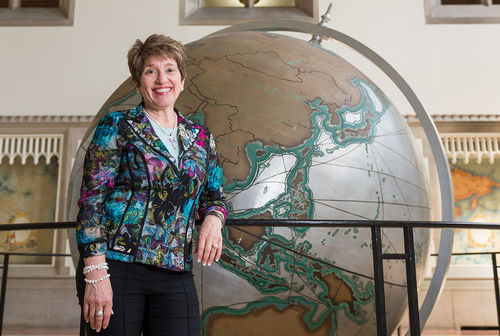Management professor Elizabeth Tuleja named Fulbright Scholar
Published: June 7, 2017 / Author: Christine Cox

When management professor Elizabeth Tuleja fell in love with China, it wasn’t just love at first sight. It was love with all five senses.
The smell of sizzling oil mingling with chili peppers and cabbage in an outdoor wok.
The taste of a whole, fresh fish sprinkled with spicy spring onions.
The sound of honking horns and bicycle bells on a crowded street.
The feel of silky plum blossoms in a bouquet from friends.
The sight of fireworks exploding in every inch of the night sky during Lunar New Year.
Until that first trip to China in 2005, Tuleja, an intercultural communications expert, had specialized in Latin American studies and Spanish language. But her immediate fascination with China changed the focus of her career.
Now she’s returning to China on a Fulbright U.S. Scholar Award, one of the most prestigious grants that an educator can receive. From August 2017 to June 2018, Tuleja will teach courses in intercultural communication and global leadership at Sichuan University in Chengdu, the capital of Sichuan province in Western China.
Funded through an annual appropriation by the U.S. Congress to the U.S. Department of State, the Fulbright Program is designed to build connections between the people of the United States and those in other countries. The program includes the Fulbright U.S. Student Program for recent graduate and undergraduate students. She joins more than 800 U.S. citizens who will teach, conduct research and/or provide expertise in 160 countries for the 2017-2018 academic year through the program. Recipients of Fulbright awards are selected on the basis of academic and professional achievement, as well as their record of service and demonstrated leadership.
An associate teaching professor of management, Tuleja joined the Mendoza College of Business in 2009, and teaches intercultural communication to undergraduate, MBA and Executive MBA students. Additionally, she leads an undergraduate summer program for Notre Dame students in Shanghai, and formerly led the Notre Dame MBA interterm program in China for several years.
In addition to her Mendoza professorship, Tuleja is a faculty fellow for the Notre Dame Kellogg Institute for International Studies and the Liu Institute for Asia and Asian Studies.
“Receiving a Fulbright has been a dream of mine,” says Tuleja, whose interest in international life began as a child when her family welcomed foreign missionaries into their home. “I am deeply honored, excited and appreciative.”She earned a B.A. from the University of New Mexico, and an M.S.Edu and Ph.D. from the University of Pennsylvania. She has held professorships at the Chinese University of Hong Kong and the Wharton School at the University of Pennsylvania.
And she is committed to adjusting her teaching approach for the benefit of the Sichuan University students. “In the East, teaching and learning are dialogic. You don’t see as much ‘either/or’ thinking as you do in the United States. In China, it’s more like having a dialogue, trying to figure things out and comprehending the qualities of each side in order to understand something.
“For Sichuan University students, I’m going to have to figure out how can I present information about cultural understanding in more a dialogic versus linear perspective. This approach is about viewing difference as something to be celebrated rather than something that is problematic. I’m really looking forward to that challenge.”
As a business professor, Tuleja sees intercultural communication as a critical skill as business continues to become increasingly global.
She also will continue ongoing research focused on enabling students to understand the elusive nature of culture. “Exploring Cultural Identity Through Metaphor Analysis: Building Trust Via Cultural Dialogue with Chinese University Students” uses visual images as a starting point for students to write about what culture means to them.
“Understanding culture is an antecedent to doing business,” Tuleja explains. “You can know all the functional aspects of international business. But if you don’t know how to develop relationships and understand people based upon their norms and behavior and what they expect from you, then you’re not going to be as successful.”
Related Stories




